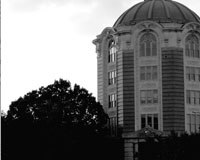
Pursuit
Doors
I dream I am pursued,
it’s disturbing but stable, self-sustaining, like a book that adds onto itself as long as you’re reading.
There’s a chair in the middle of the sidewalk where you don’t usually find furniture,
a refrigerator in the yard,
as if they need to preserve something outside,
the pavement is smooth, glittering like a mosaic, covered with rubber bands that segregate, Scotch tape that adheres, staples that penetrate,
the kind of stuff I keep in my drawers.
It’s not that dark, but all the pink-toned lights are on,
and in the bushes along the road the coppery iridescent beetles make delicate patterns in the leaves like laceworkers ruining their eyes in Belgium.
It seems more dangerous than it is.
Or is it more dangerous than it appears?
I’m not having an argument, not arguing with anybody,
I don’t think it’s a disagreement,
it’s a different feeling,
or a different amount of the same feeling.
I’m not really steering,
not turning one way or the other—
I’m not being very elusive, as if we’re irreconcilable but inseparable apparently,
attached to each other by a kind of long rigid bar or connector it’s impossible to get out of,
although I don’t think I’m trying to get out,
I’m not being very productive,
unable to speed up,
even in dream incapable of suspending the usual limits,
as if to emphasize the association of imagined incidents with real needs.
I’m not sure how long it’s going to last.
I don’t notice my breathing,
it’s not tiring,
and I’m not thinking about stopping, not right now.
On the side of the road I see children running around in the yards,
trying to scare others the way they’ve been scared.
Nobody tells them to stop.
Three doors, identical in appearance,
as if they’re copying,
one plus a pair,
less than fifty-fifty but not much less,
parallel and perpendicular, like a Josef Albers painting, structure combined with the absence of information,
a kind of standardized tranquility.
There isn’t a frame separating them from their surroundings.
Not secret but protective, like the door of a refrigerator.
You have to choose, and everybody agrees it’s a benefit to have choices,
more than one,
it’s the essence of shopping,
distinguishing among individuals similarly situated.
Free to act in accordance with your inclinations,
I almost said give into although it isn’t a donation.
You don’t need to have a reason.
It’s not a migration here and back, because of the warmth typically,
or a trip on the map, or across the map, which has its hands full with roads, yellow and red, double red, single red,
the gray ones are merely unimproved.
The doors were here before you got here,
in front of each one there’s a screen door screening the door, as if they’re being modest,
and in back a back door in case the front is in use or unavailable.
There aren’t any waiting rooms,
if an alarm goes off, there’s no way of knowing whether it’s intended to let you know there’s some danger
or to inform somebody else you’re here.
Nobody says this is where you belong,
or this is the one for you,
it’s an accident in the sense that you’re involved in the execution but not in the planning,
it doesn’t help to look away, or look out of the corner of your eye,
or touch the surface with the tips of your fingers,
one by one or all together.
If they’re swollen or enlarged it’s only to keep up with the others—
and what if each of them is more attractive than the others,
what if each is superior to the others?
Of course you’d rather be the type of chef who whips something up
and it’s a masterpiece.
Peter Leight has previously published poems in Paris Review, Partisan Review, AGNI, Western Humanities Review, Cincinnati Review, Seneca Review, The Southampton Review, Cimarron, Hubbub, UCity Review, and other magazines.

